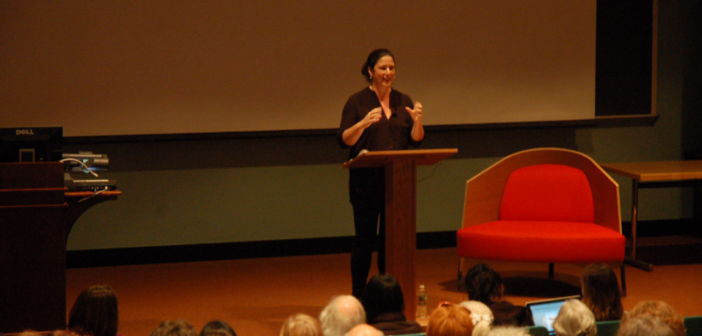Spinster. Thornback. Witch. None of these words are particularly pleasant, but historically they have all been used to describe the same thing: single, unmarried women.
Author Rebecca Traister discussed these and other words in her talk Thursday night in Whitaker auditorium.
A self-proclaimed “feminist journalist” and a writer-at-large for New York Magazine, Traister said she became aware of the societal traditions and expectations surrounding marriage when she got engaged in her thirties.
The lecture was held as part of the university’s Friends of the Library Speaker Series and was originally scheduled in February before it was canceled due to a snowstorm.
Traister said although she was older than what she described as a “typical” bride, her friends insisted on throwing her a bachelorette party and giving her gifts that would be more practical for a younger person.
“At our wedding, they’re giving us plates,” Traister said. “We’re in our thirties, we already have plates. The gift should be paying someone to come and take away all these plates!”
Through her own experiences as a bride, Traister became interested in learning more about what marriage meant in the past and how it has evolved as a practice throughout history.
Initially Traister said she planned to have her book be more about the present day, with a heavy focus on politics. However, as she began researching she was drawn to the way marriage has shaped the course of American history.
“Marital laws are intertwined with power dynamics,” Traister said.
Traister led her audience through an unconventional look at America over the centuries, showing how marriage impacted major events and initiated cultural shifts.
She said marriage has varied by region, such as in the Southern colonies in the eighteenth century, where having considerably fewer women led to girls being married as young as 12.
She contrasted this with a situation in Boston a century later. Middle-class white women far outnumbered the men, leading to female couples living together as though they were married to maintain economic stability.
Traister said the institution of marriage is something that led to major societal changes like the suffragette movement, abolitionism and Prohibition, which was led by wives seeking to ban liquor because of their husband’s violent tendencies when drunk.
“To the government, it made more sense to ban alcohol altogether than to address domestic violence,” she said.
She explained how marriage has evolved over time from being something that was considered necessary to ensure a woman’s economic status and domesticity.
Traister said although women have far more freedom and choice today with marriage, “old maid” stereotypes still lingered as recently as last century. She described how only decades ago Barnard students who were engaged received a corsage at graduation.
Single women were handed a lemon.
Ellen Hanover and Cynthia Reiss were both in attendance and commented how Traister’s talk referenced their own experiences with marriage. Both women are in their 60s and said Traister’s description of the courtship process and pressures to get engaged was accurate.
“Today my grandson’s worried about finding a job when he graduates,” Hanover said. “At my graduation, you were crying if you didn’t have a ring.”
Reiss said Traister’s description of marriage could be applied to the presidential election. During the lecture, she talked about “Hillary Hatred Syndrome,” or hesitation toward seeing women in positions of power.
“It’s Biblical, even from Adam and Eve,” Traister said. “There is an instinctive pull toward writing off a woman as distrustful.”
Reiss said although she feels women have more opportunities when it comes to marriage, she still thinks people have trouble accepting them in male-dominated roles.
“It’s still the same, whether I’m 18 or now,” she said. “People can see women in a house, but not the White House.”
Traister has long been familiar with Lehigh. As the daughter of an English professor, she described herself as “a proud graduate of Lehigh day care.”
“Being back on campus brings back a lot,” Traister said. “I was in Linderman before my talk and it was like ‘Whoa, this is real familiar.’”






Comment policy
Comments posted to The Brown and White website are reviewed by a moderator before being approved. Incendiary speech or harassing language, including comments targeted at individuals, may be deemed unacceptable and not published. Spam and other soliciting will also be declined.
The Brown and White also reserves the right to not publish entirely anonymous comments.